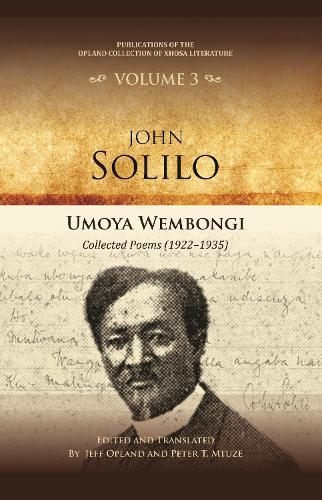Overview
All 65 of John Solilo's poems from Izala, now out of print, with an additional 28 first published in newspapers, in isiXhosa and English translation, with a comprehensive introduction John Solilo (1864-1940) was a prolific contributor to Xhosa-language newspapers. He submitted letters and articles on a variety of issues, local news reports from Cradock and Uitenhage, and a considerable body of poetry. His major literary contribution was his collection of poems entitled Izala (A Rubbish Dump), published in 1925, the earliest volume of poetry by a single author in the history of Xhosa literature. Solilo's literary reputation today, however, is at variance with his prominence as a major author in the first four decades of the twentieth century: he is hardly mentioned, if at all, by literary historians, Izala has long been out of print, and copies can no longer be located. In restoring to the public domain the 65 poems that made up Izala and adding an additional 28 that were published in newspapers both before and after the appearance of Izala, the editors hope to revive John Solilo's reputation as a poet, and to establish his status as a pre-eminent Xhosa author. In his poetry, Solilo urged passivity and opposed political revolt, but he could also be scathing in his denunciation of black indignities suffered under white control, inspired as he was by umoya wembongi, the spirit of the imbongi, the praise poet whose stirring declamations roused his audiences to action or contemplation. University of KwaZulu-Natal Press: Southern African Development Community
Full Product Details
Author: Jeff Opland ,
Professor Peter T Mtuze
Publisher: James Currey
Imprint: James Currey
ISBN: 9781847014467
ISBN 10: 1847014461
Pages: 436
Publication Date: 09 December 2025
Audience:
College/higher education
,
Undergraduate
Format: Hardback
Publisher's Status: Forthcoming
Availability: Not yet available

This item is yet to be released. You can pre-order this item and we will dispatch it to you upon its release.
Author Information
JEFF OPLAND held appointments at the University of Cape Town, University of Durban-Westville and Rhodes University and taught at the Universities of Toronto, Yale, and Leipzig as well as Vassar College before his retirement. PETER T. MTUZE is the most prolific living isiXhosa writer: he has produced novels, short stories, essays, drama, poetry, autobiography and language books. Mtuze's first book, UDingezweni (1966), is regarded as a classic novel. One of his singular achievements was his translation of former President Nelson Mandela's autobiography, Long Walk to Freedom, into isiXhosa. He worked on the University of Fort Hare Xhosa Dictionary Project, at the University of South Africa and at Rhodes University, where he retired as Professor Emeritus.



